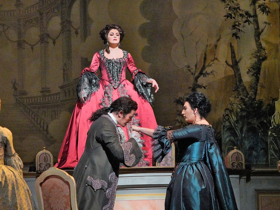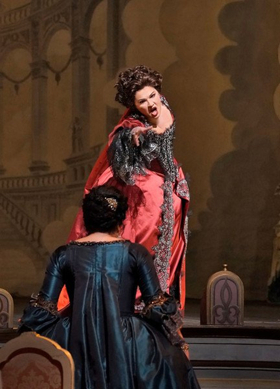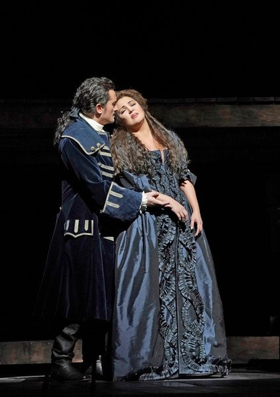Review: Fireworks from Met's New ADRIANA LECOUVREUR with Netrebko for New Year's Eve

Anita Rachvelishvili. Photo: Ken Howard/Met Opera
On New Year's Eve, the Metropolitan Opera unveiled a new production of Cilea's ADRIANA LECOUVREUR, with a high-powered, audience-pleasing cast--headed by Anna Netrebko--in a production by Met favorite David McVicar, appealingly designed and costumed, and played elegantly by the Met orchestra under Gianandrea Noseda's sweeping baton.
Somehow, for me at least, it didn't quite amount to the sum of its parts.
Technically, it wasn't a new production, opera finances being what they are today. That distinction went to the Royal Opera-Covent Garden, where it was first seen in 2010, starring Angela Gheoghiu and Jonas Kaufmann, followed by the Liceu in Barcelona in 2012 with Barbara Frittoli and Roberto Alagna. (Gheorghiu, with Marcelo Alvarez this time, took it to Paris in 2015.)
Netrebko and Beczala finally came into the picture in Vienna in 2017, in this smartly designed theatre-within-a-theatre concept by Charles Edwards, with Adam Silverman's effective lighting and the lush Brigitte Reiffenstuel costumes. (San Francisco, also a co-producer, doesn't seem to have had it yet.) In short, McVicar and his stand-ins (including Justin Way, who was associate director in New York, and has done it elsewhere as well) have had plenty of time to get out the kinks.
Too bad they couldn't do something about the opera itself, though they tried, by taking the story seriously rather than making it a parody of itself.

Photo: Ken Howard/Met Opera
As I said, the performance of this verismo potboiler was filled with an A-list cast, starting with Netrebko in the title role--a star of the 18th century Comedie Francaise, as they say "based on a true story." (Of course, it was not without embellishment, including an unfortunate end for the diva to be found nowhere in her bio: death by violets.)
If she'd been luckier, Adriana might have gotten to sing Puccini's "Vissi d'arte" (since she was someone who, indeed, lived for art) but no such luck, Cilea being rather obscure for good reason. But even he came up with a couple of good tunes in his score, including "Io son l'umile ancella," Adriana's version of the nature of her life on stage.
After a slightly rocky opening, Netrebko made the best of her opportunities, showing off both her ability to float some beautiful high notes and her acting skills, particularly in Act IV. Her highlight was an exquisite "Poveri fiori" ("Poor flowers"), a song to the dead violets she receives on her birthday, which are the poisoned remains of ones she once gave her lover, Maurizio (tenor Piotr Beczala), who she thinks has left her "sola, perduta, abbandonata" (yet another Puccini aria that might have fit the character).
Beczala cut a fine figure as Maurizio and made him into a palatable character, even though he is two-timing the two women in his life, Adriana and the Princesse de Bouillon. The tenor showed off his ability to keep the sweetness in his voice and ringing high notes (despite moving on to more demanding roles like Don Jose and Lohengrin), as in Act I's "La dolcissima effigie" and Act II's "L'anima ho stanca."

Ken Howard/Met Opera
Once again, mezzo Anita Rachvelishvili as the Princesse proved a valuable asset on the Met roster, as an able foil for Netrebko--though I preferred their rivalry in AIDA earlier in the season, where she managed to turn Amneris into a flesh-and-blood woman. She has a rich, potent voice, able acting abilities and an authoritative stage presence--the trifecta for singers. She may not be as well known as some others in her fach, but she's the real thing. (Watch out for her in the second run of SAMSON ET DELILA coming up.)
Yet, despite the trio of first-rate singers, their triangle didn't always have the appropriate effect. While some might view the confrontation between the female leads (later adding the tenor) as abandon cast to the wind, I found it simply loud--like they thought they were doing WALKURE rather than verismo. Yes, things calmed down later in the opera, happily, and the piteous end for Adriana came off as dramatic as it should, but there were times that had me worried.
The fourth of the principals, baritone Ambrogio Maestri, gave what might have been the most nuanced performance, as Michonnet, the stage manager at the theatre. Known best here for his broadly comic FALSTAFF in the Met's current production and the title role in DON PASQUALE, Maestri scaled back his imposing voice to play a dignified, poignant character who dreams of Adriana's love but knows he has no chance. Another singer best known hereabouts for his comic personas--his Bartolo in BARBIERE is a pip and his Sulpice in FILLE DU REGIMENT is coming up--is bass Maurizio Muraro, who plays the Prince de Bouillon, husband of Adriana's rival. Tenor Carlo Bosi was quite effective as the Prince's ally, the Abbé of Chazeuil.
The opera also had a ballet sequence, The Judgment of Paris, headed by Kfir Danieli as Paris, choreographed by Andrew George and, for once, it was a delightful diversion to the action.
The title role has long been a favorite for singers, though it only shows up occasionally. One of its most notable champions was Rosa Ponselle, one of the most famous singers of the 20th century, whose retirement was reputedly hastened when Edward Johnson, the general manager of the Met in the '30s, turned down her request for a staging of ADRIANA. Clearly, the Met was taking no chances on their future with Netrebko.
ADRIANA's running time is about 3 ½ hours. There are just five more chances to hear this cast in the production--January 4, 8, 12 matinee, 16 and 19--with Jennifer Rowley taking over as Adriana for the last two performances, on January 23 and 26. Further information, including starting times can be found on the Met's website here.
Reader Reviews
Videos

